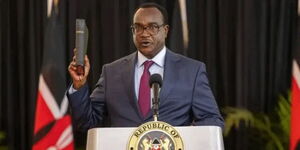The Donald Trump administration's decision to drastically cut funding to the US Agency for International Development (USAID) will have grave effects on several countries, including Kenya, in the next few years, according to a new study.
According to a Lancet study on the impact of USAID funding cuts, the decision to freeze the aid could lead to 14 million avoidable deaths worldwide by 2030, with over 4.5 million children under five likely to die globally.
USAID has been a crucial source of humanitarian support, contributing to at least 40 per cent of global humanitarian funding. Kenya, which has been a huge beneficiary of USAID-funded health programs, could see decades of strides in the health sector reversed as a result of the funding cuts.
The study's findings, particularly regarding malaria control and food security, paint a worrying picture for Kenya. Notably, USAID-led malaria efforts have significantly reduced cases in Kenya and the world at large, since the fund has been a cornerstone of both the President’s Malaria Initiative (PMI) and food aid programs.
While PMI, with the support of USAID, helped protect the lives of 500 million people, mostly in sub-Saharan Africa, the latest cuts, which include slashing PMI’s funding by approximately 47 per cent in 2025, have already had worrying impacts in some Kenyan counties.
For example, there have been delayed indoor residual spraying campaigns in Busia and Migori counties, while over 40 per cent of insecticide-treated net distributions and nearly 30 per cent of seasonal chemoprevention efforts have stalled.
Researchers used models from two scenarios for their study. One model analysed the potential impact of continuing with funding at the 2023 level versus the sharp reduction of 83 per cent announced in March 2025.
"Current steep funding cuts could result in more than 14,051,750 additional all-age deaths, including 4,537,157 in children younger than five years, by 2030," the study stated.
The study further estimates that the budget cuts by Trump's administration could have consequences similar to those of a global pandemic or armed conflict.
Besides healthcare, USAID has also been crucial in supporting nutrition and food aid through partnerships with bodies like UNICEF. However, the cuts have left several populations in jeopardy, particularly in the Northern parts of Kenya. In Turkana, for example, where 77 per cent of the population lives below the poverty line, the absence of food aid heightens hunger and malnutrition.
The Lancet study is the first comprehensive one done to assess the impact of total cuts on the world population in the near future. Amid concerns of a full-blown crisis, the international community has been urged to intervene for the continuation of foreign aid, particularly that which benefits children.
Earlier in June, American billionaire and philanthropist Bill Gates revealed an upcoming meeting with Trump aimed at finding a compromise on the halting of funding aid to Africa.
"I am sure in the next three to four months I will get a chance to share my thoughts with him (Trump). I will make a strong case that the US should stay involved (in aid funding). I will be as loud as I can on Trump’s aid cuts,” Gates stated.












